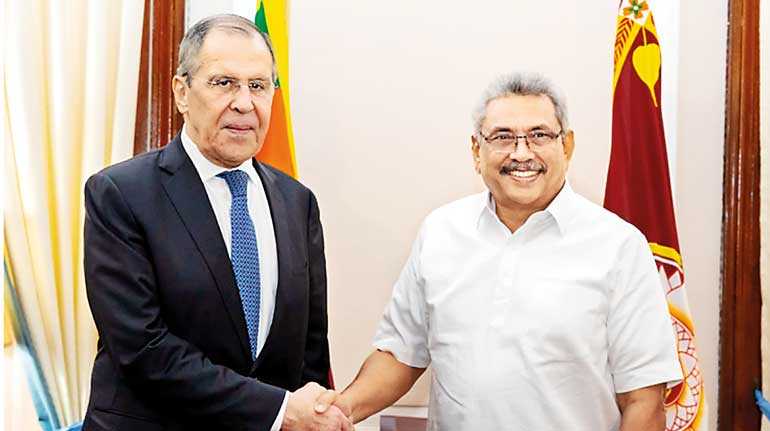Monday Feb 16, 2026
Monday Feb 16, 2026
Monday, 10 February 2020 00:19 - - {{hitsCtrl.values.hits}}

Russian Minister of Foreign Affairs Sergey Lavrov with President Gotabaya Rajapaksa
By Yury Materiy
On 10 February each year the Russian diplomatic service celebrates its professional holiday – Russian Diplomats’ Day – which was established by Presidential Decree in 2002. The date is closely associated with the history of Russia’s first foreign affairs agency – the Ambassadorial Department established on 10 February 1549.
Celebrating this holiday, it is a good occasion to look back at the Russia’s diplomatic performance in 2019.
Russian diplomacy is pursuing an independent multivector policy set out by the President of Russia and has been working to reduce international tensions and to strengthen the democratic principles of international communication based on law.
We are convinced that the overriding trend of global development is the objective process of the formation of a multipolar world. New centres of economic might and financial power. We are doing our best to maintain all aspects of global and regional security.
Our top priorities include the fight against international terrorism, in particular in Syria, as well as efforts to promote a political process there and to settle the current humanitarian problems of Syrians. Positive achievements were reached last year including the launch of the intra-Syrian Constitutional Committee through the concerted efforts of the guarantor countries of the Astana format. Syria’s post-conflict rehabilitation and its reintegration into the Arab family are gaining priority now.
Russia also contributed to efforts to overcome other conflicts in the Middle East and North Africa, including in Libya and Yemen. The situation in the region could be greatly improved through the implementation of Russia’s Collective Security Concept for the Persian Gulf Region.
Russia traditionally prioritises expanded collaboration with its partners in the Eurasian space, primarily within the framework of the Collective Security Treaty Organisation, the Commonwealth of Independent States (CIS) and the Eurasian Economic Union (EAEU).
A few lines about the promotion of Eurasian integration. The EAEU’s expanded foreign ties by signing free trade agreements with Singapore and Serbia in 2019. Agreements on trade and economic cooperation between the Eurasian Economic Union and the People’s Republic of China, as well as an interim agreement with Iran, entered into force last year.
The EAEU continues active talks with Israel and Egypt. It has been decided to launch a negotiating process with India. All these actions are in line with Russian President Vladimir Putin’s initiative to establish a Greater Eurasian Partnership that would be open to all the countries of our common continent, Eurasia.
Russia managed to make headway in resolving the domestic Ukrainian crisis. A Normandy format summit took place after a three-year interval after the new Kiev leaders managed to start fulfilling the decisions of the two earlier Normandy Four summits. We hope that the December 2019 decisions in Paris will make it possible to move ahead in implementing the Minsk Package of Measures.
This year, there are plans to continue maintaining global security and strategic stability, including efforts to prevent an arms race in outer space and the unacceptability of weaponising cyberspace. Russia will completely activate the potential of the UN, the G20, the CIS, and the Eurasian Economic Union, as well as the possibilities opened up by its chairmanship in BRICS and the Shanghai Cooperation Organisation.
The work will be continued with the four other permanent UN Security Council members, including on such key aspects as the preservation and consolidation of the UN’s central coordinating role in global affairs and the inviolability of the principles governing international affairs as set forth in the UN Charter. President Vladimir Putin has proposed holding a summit of five permanent UN Security Council members in 2020.
The UN Charter and as well as the principles, such as the sovereign equality of states, non-interference in internal matters, respect for territorial integrity, peaceful resolution of disputes remain the anchor of any discussions conducted on international arena. They should be applicable to each and every situation in the world. They should be the guiding point for any discussion to develop any new ideas in the world arena.
The international situation in 2019 remained complicated. Some countries nevertheless aimed at disrupting the international legal framework of security and replacing international law with terms like ‘rules-based world order,’ which allow for creation of an order based on rules that suits one’s purposes, as well as ‘Indo-Pacific Strategies’ – an attempt to reconfigure the existing structures of the Asia-Pacific Region and to move from ASEAN-centred consensus-seeking forms of interaction to something that would be divisive. We have to be careful with this terminology, which looks very benign but might mean something else.
The 21st century is the time when we must get rid of any methods of dealing in international relations which smack of colonial or neo-colonial times. Unilaterally imposed sanctions are not going to work. This is not diplomacy. Equitable and democratic world order should be based not on the balance of brutal force, but rather should be built as a concert of interests, models of development, cultures and traditions.
Russian-Sri Lankan relations is of truly friendly nature. The latest example of our ever-growing partnership is the visit of the Minister of Foreign Affairs of Russia Sergey Lavrov to Sri Lanka on 14 January. The Russian Foreign Minister met with President Gotabaya Rajapaksa, Prime Minister Mahinda Rajapaksa and Minister for Foreign Relations Dinesh Gunawardena.
The parties discussed the current status of Russia-Sri Lanka relations, prospects for advancing political dialogue and expanding cooperation in trade, the economy and the humanitarian area and reviewed matters of expanding the bilateral legal framework.
The sides focused on more profound collaboration at international organizations, primarily the UN and its specialised agencies. The visit of the Russian Foreign Minister is a major event that will give further impetus to the bilateral cooperation and will contribute to our time-tested friendship.
(The writer is Ambassador of Russia to Sri Lanka.)